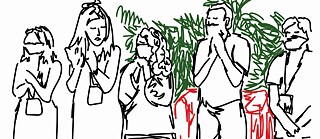Conference of the Absent
Questions from the theatre for our lives

The premiere of “Conference of the Absent” on February 24 at Teatro do Barrio Alto (TBA) was followed by two more public performances and the Academy of the Absent workshop, led by Helgard Haug of Rimini Protokoll. The performance was also discussed at the regular TBA audience club. Each of these unique interactive events was well attended.
By Raquel Pedro
The performance
The staging combines everyday objects (shelving, for example) with audiovisual elements (graphics and voice) conveying information. The audience is invited to participate directly by providing the voices for the contributions of (absent) speakers from around the world. This form of participation centers attention on the questions confronting the audience: when spectators take the stage and physical absence is mediated by “avatars”, who represents whom? What remains of an absent person to be represented?The seriousness of the effort to represent others and their stories as collected by Rimini Protokoll sometimes contrasts with laughter in the voices of those who find themselves onstage. The stories told originate in present-day social and political reality and the concerns implicit in it, as in the story of a Jewish survivor of the Second World War. Questions of gender arise in an account of a space expedition set up by astrophysicists for the express purpose of researching the effects of space travel on the female human body. Ecological issues are introduced with the activist Les Knight, who sees the sole hope for planetary survival in the non-reproduction and consequent extinction of the human species. Not by chance, this section ends the performance, leaving the audience directly confronted with the proposition while making clear that its inclusion is no mere “meta-theatrical” gesture: Rimini Protokoll put their commitment to reduction of destructive carbon emissions into real-world practice by refusing air travel.
The fundamental theme of the two-and-half-hour production is representation: in appearing onstage “for someone else”, audience members enact what TBA artistic director Francisco Frazão calls “the essence of theatre”. The spectators are actors, as is confirmed when they are called back to the stage to receive applause. By virtue of their diversity, they are able to bring what Helgard Haug called “multiple angles” to a single story. This aspect can be considered in relation to Chimamanda Adichie’s The Danger of a Single Story, cited by Portuguese director Raquel André in the play Coleção de Espetador, where non-actors likewise appear on stage, telling their life stories by way of performances, films and museums they have seen. Both plays emphasise the importance of standpoint in the telling of a story, and of the multiple narratives potentially encompassed in a situation or event.
But what if someone cannot be represented? One of the statements in Conference of the Absent must be presented by a specific person we can only get to know if someone in the audience has those precise characteristics. One or two members of the audience at the premiere were not white but did not hold shares at the stock market. At the next two performances, there was not even a single non-white person. So the speaker could not be present. This absence called attention to those who cannot be represented, leaving the audience with a sense of emptiness and several questions. Who goes to the theatre? For whom is it intended? What does this tell us about Lisbon as a city? The approach of Rimini Protokoll emphasises this effect, showing how the performance itself is never innocent of perspective.
Academy of the Absent
Academy of the Absent brought together participants from a performing arts background for a workshop where Helgard Haug introduced and went into depth on the creation of Conference of the Absent. The workshop was organized under the aegis of the ReMapping Memories Lisboa-Hamburg project, which addresses questions including absence, visibility, representation and resistance in the post-colonial city. Elaboration of the Rimini Protokoll methodolgy provided tools both to actors and to students and teachers from Teatro do Oprimido. Many interesting points were raised in collective conversation through the day. Initial discussion focused on the question of whether the performance might have seemed “false” or “pre-planned”, as though it had not really been audience members who appeared onstage. After some clarification of processes, there followed a discussion of questions of representation and ways of working with the “absent”, in all the dimensions this implies. The permanent absence of Bruno Candé and Gilberta Júniar -- a black man and a trans woman brutally murdered in hate crimes – was mentioned. Some participants spoke of absence felt in their own lives. One said: “even though I really wanted to take part in the performance, I couldn’t bring myself to volunteer. But in a certain sense I felt represented by another young woman who is also here today”. What is held in common, then, is always socially subordinated. This is why we must go on speaking of it and bringing it into sight, ensuring that its presence is always immediate.Both Academy and Conference of the Absent raise questions and take them beyond a simple presentation of solutions. A few questions to bear in mind as our lives go on: who is absent from our life? Why? How might they become present? In the same form as the Conference of the Absent speakers?

